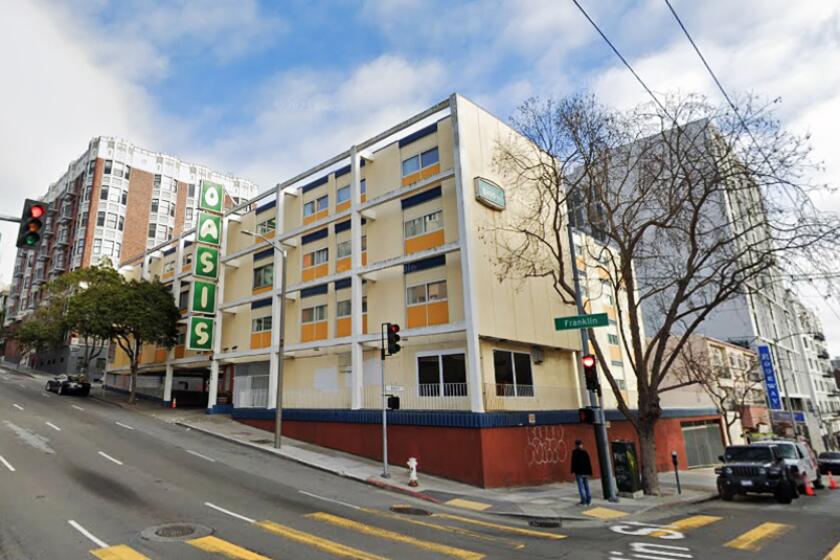Voters to Decide How Council Is Elected
Voters will decide in March whether to scrap the city’s century-old system of electing City Council members at-large in favor of district elections, which some say would give more equitable representation to ethnic minorities.
The council voted, 3 to 1, this week to place a measure to amend the City Charter on the ballot during next year’s City Council primary. Mayor Donna Smith voted against the proposal. Councilman Mark Nymeyer was absent.
Pomona voters rejected a similar proposition 16 years ago and the city successfully defended itself two years ago against a lawsuit seeking to impose districts. But pressure on cities to switch to district council elections has been increasing in recent years. Voter rights groups have sued several cities throughout the Southwest United States, claiming that at-large elections effectively disenfranchise areas with large minority populations.
Perpetuated Discrimination
In July, a federal appellate judge ruled that the city of Watsonville, in Santa Cruz County, had perpetuated discrimination by having its City Council members elected at-large. While about half of the city’s 25,000 residents are Latino, no Latino had been elected to public office in 15 years.
“It would be in the best interests of Pomona to do it on our own rather than having the court tell us what to do,” said Councilwoman Nell Soto, who proposed the measure.
Pomona is now divided into four council districts. But while council members must live in the district they represent, they are elected by a citywide vote.
Although the city’s population is 30% Latino and 19% black, only three members of ethnic minorities have ever been elected to the council. Soto, a Latina elected in 1987, is the only ethnic minority council member.
Pomona successfully defended itself against a 1986 discrimination lawsuit by the Texas-based Southwest Voter Rights Education Project. Attorneys for the city argued that because minority groups are evenly dispersed throughout Pomona, the outcomes of most council races would have been no different under district elections.
Different Demographics
An appeal is pending, but City Atty. Patrick J. Sampson said because Pomona’s “demographics” are different from Watsonville’s, the federal judge’s ruling there would have no impact on the Pomona case.
In casting the lone dissenting vote, Smith cited the Pasadena Board of Directors, which voted to place the district election issue on the ballot in 1980. Civil rights groups that had sued Pasadena won $250,000 for attorneys’ fees after arguing that their suit was the impetus for the city’s decision.
Sampson told the mayor it was “highly improbable” the same thing would happen to Pomona. In Pasadena’s case, he said, the council voted to place the referendum on the ballot soon after the suit was filed, making it appear that the legal action was responsible for the decision. Pomona, on the other hand, has already fended off such a suit, Sampson said.
“I don’t think there’s too much of an argument that could be made that if we decided to put it on the ballot, (the plaintiffs) would get attorneys’ fees,” Sampson said.
Nonetheless, Smith said she was not willing to take the risk.
Angry Response
“I believe the voters should decide, I honestly do,” Smith said. “But I really want to see this lawsuit settled before I vote to put it on the ballot.”
Smith’s opposition drew an angry response from the measure’s proponents.
“A lawsuit might be important if you’ve forgotten the principles of democratic government,” Councilman C. L. (Clay) Bryant said.
In November, 1972, voters rejected district elections, with 13,701 voting against the proposal and 11,891 favoring it.
But all the residents who spoke on the issue at Monday night’s council meeting praised the idea of district elections. Many said the system would provide better representation, not only for members of minority groups but for all citizens.
More Candidates
“Why should someone in District 1, 3 or 4 vote for a representative for me in District 2?” asked resident Gus Wilson. ‘If we go to independent district voting, I think the councilmen would be more responsive.”
Willie White, who lost a campaign to become the city’s first black councilman in 1983 by 71 votes, said district elections would also encourage more people to run for office.
Because a candidate would have to campaign in only one quadrant of the city, the cost of seeking a seat on the council would be reduced dramatically, White said. While candidates must now spend more than $20,000 on signs and mailings, district elections would help less wealthy office-seekers who must rely on cost-effective campaign strategies such as door-to-door canvassing, he said.
“In the at-large system we have now, it’s almost impossible for (a candidate) to go out and meet everyone,” he said.
Bryant said district elections will also prevent voters in one district from having their right to choose a representative preempted by those in other areas of town.
“You may have a voter turnout of 15% and another district may have a turnout of 80% and not want your candidate and vote him out,” he said. “It insulates the council from the people.”
Soto said the outcome of the vote in March is not important, as long as voters get their say.
“If it doesn’t get approved by the voters, then it doesn’t,” Soto said. “At least this way, we get it over with once and for all. . . .”
More to Read
Start your day right
Sign up for Essential California for news, features and recommendations from the L.A. Times and beyond in your inbox six days a week.
You may occasionally receive promotional content from the Los Angeles Times.






